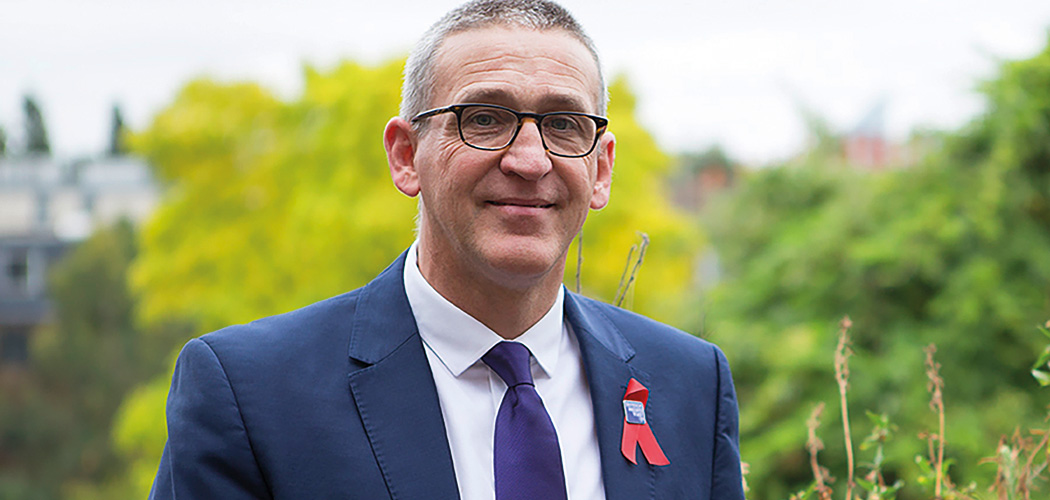With the upcoming NHS PrEP trial now ready to be rolled out in September, Daniel Warner talks to Ian Green, Chief Executive of Terrence Higgins Trust, about the impact the trial will have on our community and asks if demand for PrEP will outstrip supply.
How do you feel about PrEP becoming available on the NHS?
We’re pleased that NHS England has announced a start date for the much anticipated PrEP trial. Although this is not a long-term plan to deliver PrEP on the NHS, it does mean we’re well on the way to protecting over 10,000 people at risk of HIV. This PrEP trial has been gaining momentum in England, and is vital as we work towards ending HIV transmissions across the UK.
The priority must now be to make sure that the trial does not leave people at risk of HIV behind, and that it is rolled out speedily across the whole country, by the end of this year at the very latest. NHS England have recently stated that, although the trial will begin in some locations on 1 September, full roll-out of the trial across England would happen by Spring 2018 – but that is not soon enough, and could leave people in some locations at risk of HIV without access to PrEP for far too long.
It’s also crucial that at the end of this trial in three years time, a clear process for routinely commissioning PrEP on the NHS is agreed. So it’s good news, but it’s not the end of the story.
Do you think that demand for the drug will be greater than availability?
Yes – this is a real concern. There are only a finite amount of spaces on the trial and still many questions about how we can ensure fair and equitable access to PrEP for everyone at risk of HIV. For example, how will the trial ensure PrEP is not a postcode lottery and is available no matter where you live, particularly with it being rolled out in a staggered way across clinics in different cities and regions? If full national roll-out isn’t being promised until spring 2018, that’s a real concern. And how will the trial reach all people at risk of HIV, including black Africans, trans people and women, as well as gay and bisexual men, amongst whom awareness of PrEP is higher?
The trial is a welcome step for protecting 10,000 people from HIV infection, but in order to protect everyone at risk, we need NHS England to routinely commission PrEP for people at risk of HIV, like NHS Scotland. So it’s vital that there’s a process for ensuring this happens long-term before the end of the trial.
Do you think it will increase cases of other sexually transmitted diseases as people stop feeling the need to use condoms?
PrEP is not about replacing condoms, it is about making full use of all the tools we have to stop the HIV epidemic once and for all. Together we now have a powerful arsenal with which to end HIV: condom use, regular testing, early treatment, and – vitally – PrEP. Condoms will always be a cornerstone of HIV prevention, but we know that perfect condom use is not a reality for everyone, despite years of promotion, and condoms alone will not win the fight against HIV. Not everyone is able to negotiate condom use, for example. People who wish to take PrEP are acting responsibly to protect themselves and others against HIV. Many people. taking PrEP have told us they are more aware than ever of other STIs and their overall sexual health has improved, as they are more regularly attending sexual health clinics as part of their treatment.
Regularly testing those at greatest risk therefore will ensure early diagnosis and treatment of STIs, which should lead to a drop in STIs. In fact, gonorrhoea diagnoses have dropped by 24% at the UK’s largest sexual health clinic – 56 Dean Street in London – and this may be because people who are taking PrEP are coming into clinics to get sexual health checks as part of their treatment. This is backed up by World Health Organisation guidelines which say that PrEP increases opportunities for access to other sexual health services, and by the NICE review pointed to reassuring evidence from major trials which shows PrEP did not lead to increased sexual risk taking. In the PROUD trial, there was not a statistically significant increase in other STIs.
Do you think the availability of PrEP on the NHS is a correct use of funds?
Of course it is. It is bizarre that we are even needing to ask this question. PrEP will actually save the NHS money. In the long-term it will be far more cost-effective for the NHS to prevent people from getting HIV while they’re at risk, than to fund a lifetime of treatment for them.
If taken correctly, PrEP is nearly 100% effective in stopping HIV. The average lifetime cost to the NHS of treating someone with HIV is £360,000. PrEP, on the other hand, would only need to be made available to selected people during limited periods in their life when they’re known to be at risk of HIV. It’s a no brainer. We’re already seeing a major decline in HIV diagnoses among gay and bisexual men – the first decline we’ve ever seen. This is because, finally, we’re starting to use all of the weapons in our arsenal against HIV. Imagine what could be achieved if everyone at risk of HIV had access to PrEP on the NHS.
For more information on THT visit: www.tht.org.uk
For more information on 56 Dean Street visit: dean.st
For more information on PrEP visit: prepster.info/impact or prepster.info/impact














